Tamil Nadu Police
Tamil Nadu Police Department is the primary law enforcement agency of the state of Tamil Nadu, India. It is over 150 years old and is the fifth largest state police force in India.[3] Tamil Nadu has a police-population ratio of 1:632.
| Tamil Nadu Police Department தமிழ்நாடு காவல்துறை | |
|---|---|
| Motto | Truth Alone Triumphs |
| Agency overview | |
| Employees | 1,00,932[1] |
| Annual budget | ₹7,749 crore (US$1.1 billion) (2019-20 est.) [2] |
| Jurisdictional structure | |
| Operations jurisdiction | Tamil Nadu, IN |
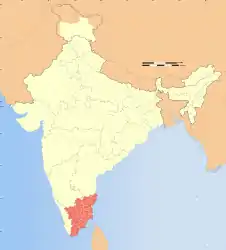 | |
| Map of Tamil Nadu Police Department's jurisdiction | |
| Size | 130,058 square kilometres (50,216 sq mi) |
| Population | 7,21,38,958 |
| Legal jurisdiction | State of Tamil Nadu |
| Governing body | Department of Home, Government of Tamil Nadu |
| General nature | |
| Operational structure | |
| Overviewed by | Department of Home, Prohibition and Excise, Tamil Nadu |
| Headquarters | Dr Radhakrishnan Salai, Mylapore, Chennai-600 004 |
| Agency executive |
|
| Website | |
| www.tnpolice.gov.in | |
For administrative purposes, the state has been divided into four police zones – North, South, West and Central each headed by an Inspector General of Police.
Inspector-general of police will be assisted by a Deputy Inspector-General Of Police with jurisdiction of range comprising 2 or more districts.
Each district is headed by a Superintendent of Police, whereas major metropolitan cities such as Chennai is headed by the Commissioner of Police equivalent to the rank of Additional Director General of Police and Madurai, Tiruchirappalli, Salem, Tiruppur, Tirunelveli, Coimbatore are headed by a City Commissioner Of Police equivalent to the rank of Inspector-General of Police.
North Zone
North Zone having jurisdiction over 10 Districts (excluding Chennai City, viz., Kanchipuram, Thiruvallur, Villuppuram, Cuddalore, Vellore, Ranipet, Thirupattur, Tiruvannamalai, Kallakurichi, Chengalpattu.
West Zone
West Zone having jurisdiction over 8 Districts (exclude Coimbatore City, Tiruppur City, Salem City) viz., Coimbatore Rural, Tiruppur Rural, Salem Rural, The Nilgiris, Erode, Dharmapuri, Krishnagiri and Namakkal.
Central Zone
Central Zone having jurisdiction over 8 Districts (excluding Tiruchirappalli City) viz., Thanjavur, Tiruchirappalli Rural, Perambalur, Ariyalur, Karur, Nagapattinam, Tiruvarur and Pudukottai.
South Zone
South Zone having jurisdiction over 10 Districts (excluding Madurai City and Tirunelveli City) viz., Madurai Rural, Dindigul, Ramanathapuram, Sivagangai, Theni, Virudhunagar, Tuticorin, Tirunelveli Rural, Kanyakumari and Tenkasi.
Role and Duties
- The Zonal Inspector General of Police will be responsible for all the Police functions including maintenance of Law and Order, crime control, internal security, civil defense, enforcement of all legislations including special laws empowering police force and various other public services in so far as his zone is concerned. He is also accountable for modernisation of police force and proposals should be routed through him as far as his zone is concerned.
- He is link in the chain of command between the Director General of Police and Range Deputy Inspector General of Police/District Superintendent of Police in his jurisdictions.
- He should endeavour by frequent personal inspections to establish and maintain efficiency and discipline, to ensure uniformity of procedure and practice and to secure cooperation between the police of his ranges/districts as well as harmonious working between the police, revenue and the judiciary.
- The Zonal Inspector General of Police will control, instruct and advise the range Deputy Inspectors General of Police/Commissioners of Police/Superintendents of Police while being careful not to supersede them in any of their proper functions or relations to their subordinates. He will not assume the role of Deputy Inspectors General of police/Superintendents of Police in times of grave disorder, taking over full control of the situation. He will pay particular attention to the training of and the discipline in the Armed Reserve and also supervise the functioning of AWPS in his Zone, so that the highest possible standard of efficiency may be reached and maintained.
- The Zonal Inspector General of Police will conduct inspection of the districts units once in two years and inspection of range units once in a year, besides taking up of 1/7th of police stations, circle officers and sub divisions. The Zonal Inspector General of Police should avoid inspection wherever it is programmed to be inspected by the Range Deputy Inspectors of Police concerned in the particular year. The Zonal Inspector General of Police will send a copy of the inspection notes to the Director General of Police through Additional Director General of Police (Law & Order). The Zonal Inspector General of Police must also review the inspection notes of the Deputy Inspectors General of police/Superintendents of Police.
- Copies of all weekly reports of Superintendents of Police/ Deputy Inspectors General of Police/ should be marked to the concerned zonal Inspector General of Police who shall review and send it up with his remarks.
- Fortnightly reports of Superintendents of Police/ Deputy Inspectors General of Police should be routed through the concerned zonal Inspector General of Police who shall review and send it up with his remarks wherever action is warranted.
- He shall conduct periodic reviews on all the aspects mentioned under par 3(i) above along with review of performance of Deputy Inspectors General of police and Superintendents of Police in his jurisdiction. A monthly consolidated report reflecting the happenings in the zone should be sent by him to the Government through the Director General of Police not later than 7th day of the succeeding month and it shall reach the Government before the 15th day of the succeeding month with the remarks of the Director General of Police. A reporting format will be evolved and standardized by the Director General of Police under information to the Government.
- He will have powers of review over all the special units in his zone whose performance appraisal also has to be incorporated in the monthly performance review report prescribed above.
Administrative Powers
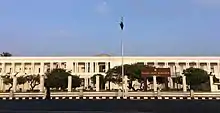
- Transfer of personnel up to the rank of Inspector of Police within the zone. All inter Range transfers of personnel up to the rank of Inspector of Police including Inspector of Police (Armed Reserve) within the Zone will be decided by the Zonal Inspector General of Police. The Zonal Inspector General of Police will issue orders of transfers to Ranges/City in respect of Inspectors/ Sub-Inspector of Police and to the Districts/Cities in respect of constabulary within his zone. The concerned appointing authorities viz the Deputy Inspectors General of Police/Commissioners of Police in respect of Inspectors of Police/Sub Inspectors of Police and the Superintendent of Police/Deputy Commissioner of Police in respect of constabulary will issue necessary transfer and posting orders. All norms relating to transfers and postings prescribed in the Rules and Guidelines issued by the Government/Director General of Police should be followed. It should be ensured that the officer gets a chance to serve in different wings of the Department particularly the ones which are essential for promotion. It should be ensured that no one is transferred before completion of his tenure in the present station (except on adverse grounds). At the same time no one should be allowed to continue in the same police station after completion of 2 years in violation of G.O.Ms.No.661, Home (Police-I) Dept., dated.13.05.91. Those who have completed 2 years (or) will be completing 2 years on 1 April should be transferred out. In the case of pre-mature transfers on extra ordinary circumstances, Director General of Police shall be addressed explaining the necessity for orders and ratification obtained.
- Sanction of Casual Leave/Holiday Permission / Permission to leave Headquarters: The power of sanctioning Casual Leave/Holiday Permission/ Permission to leave headquarters to the district Superintendents of Police/Deputy Commissioners of Police, Range Deputy Inspectors General of Police and Commissioner of Police, hitherto exercised by the Director General of Police be now delegated to the Zonal Inspector General of Police.
- Sanction of MSEs up to the level of the Inspectors of Police. Now, this power has been vested with ADGP., (L&O), Chennai-04.
Equipment
Majority of the equipment used by Tamil Nadu police are manufactured by Indian Ordnance Factories controlled by the Ordnance Factories Board, Ministry of Defence, and the Government of India. Tamil Nadu police are equipped with various weapons such as AK-47, Ishapore 2A1 rifle, Lee–Enfield rifle, INSAS rifle, FN FAL rifle, Glock handguns, shotguns and grenade launchers.
Special Units
The special units of Tamil Nadu Police headed by Additional Director General of Police/Inspector general of police which is also supervised overall by Director General of Police. These Special Units perform specific functions related to security, intelligence, criminal investigations and support services.[3] They are as follows:
- Armed Police or Tamil Nadu Special Police
- Civil Defence and Home Guards
- Civil Supplies, CID
- Coastal Security Group (CSG)
- Crime Branch, CID
- Crime Against Women and Children-Special Wing
- Cyber Crime Wing
- Economic Offences Wing (EOW)
- Intelligence
- Operations – TN Commando Force & Commando School
- Prohibition Enforcement Wing
- Railway Police
- Social Justice and Human Rights
- Special Branch, CID including Security
- State Crime Record Bureau
- Technical Services
- TNEB Vigilance
- Tamil Nadu State Transport Corporation Vigilance
- Traffic Planning and Road Safety Cell
- Special Task Force (STF)
- Directorate Vigilance and Anti-Corruption
Honours
Tamil Nadu police has the largest strength of women police personnel and women police stations in the country, the first women police battalion of special police and commando force, the first established finger print lab, the first integrated modern control room in the country and has the greatest number of computers amongst police departments in the Country.
Photo gallery
 CRPF awards ceremony
CRPF awards ceremony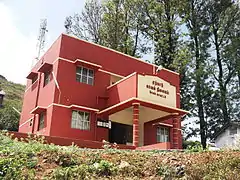 Yercaud Police Station in Salem district
Yercaud Police Station in Salem district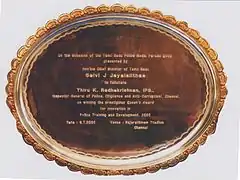 Tamil Nadu Police Shield
Tamil Nadu Police Shield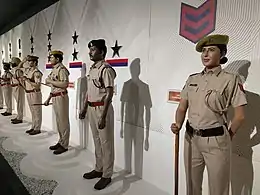 Police Ranks and Uniforms
Police Ranks and Uniforms
References
- "Tamil Nadu Budget Analysis 2019-20" (PDF). prsindia.org. 2019.
- T a m i l N a d u P o l i c e Archived 24 October 2007 at the Wayback Machine
External links
| Wikimedia Commons has media related to Tamil Nadu Police. |
